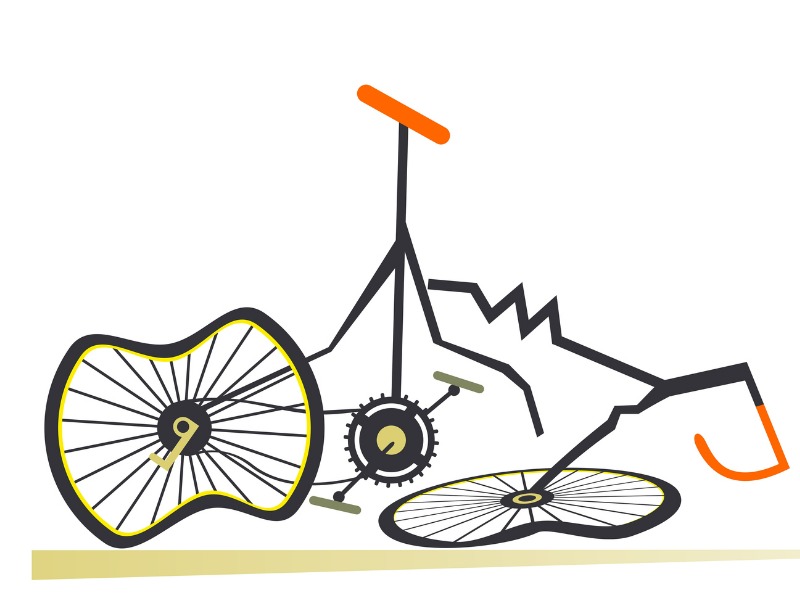What got a BC cyclist’s accident claim dismissed?

A cyclist who took action against an insurer, rather than the driver of the motor vehicle involved in an accident, recently saw his case dismissed.
The small claims dispute before British Columbia’s Civil Resolution Tribunal (CRT) noted that on October 26, 2022, Sean Daniel Murphy rode his bicycle from a sidewalk across a private parking lot laneway before colliding with a motor vehicle insured by the Insurance Corporation of British Columbia (ICBC). Both Murphy’s bicycle and the vehicle were damaged.
An ICBC investigation found Murphy fully responsible for the collision. ICBC paid the vehicle repair costs and sought reimbursement from Murphy, who disagreed with the insurer’s assessment that he was solely liable for the $1,574.99 cost to replace his bicycle and argued the vehicle’s driver was traveling at an unsafe speed and not paying attention.
Murphy also claimed ICBC overpaid for the vehicle repairs and that he should not be responsible for paying them.
Who’s insured?
ICBC noted Murphy doesn’t have a policy with them, so they’re not responsible for replacing his bicycle. And, it counterclaimed for an order that Murphy pay the $2,802.33 for vehicle repairs.
On the day of the accident, CRT noted Murphy cycled north along a sidewalk separating a furniture store from a parking lot and headed toward a perpendicular laneway running between the furniture store’s northern wall and another store’s southern wall.
“Concrete barriers block the furniture store’s parking lot at the north end [preventing] vehicles from exiting the furniture store’s parking lot and entering the laneway,” wrote tribunal member Christopher Rivers in an April 24 decision.
Murphy rode through a gap between the barrier and the furniture store as the vehicle driver drove west along the laneway toward a road. Murphy said the vehicle didn’t see him so he braked, causing him to swerve, fly off his bicycle and hit the vehicle’s rear panel. Photos of the vehicle show a dent in the panel above the rear wheel, a scrape along another panel and partial separation of the rear bumper.
Murphy said ICBC should pay to replace his bicycle, and argued it shouldn’t have found him 100% liable for the accident.
“However, Mr. Murphy has incorrectly brought his claim against ICBC instead of the vehicle driver,” Rivers wrote. “He does not have a claim in negligence against ICBC. I note further that ICBC says Mr. Murphy did not have any contract of insurance under which it must pay him, so he also has no claim for breach of contract or statutory duty.
“I dismiss Mr. Murphy’s claim against ICBC [but] nothing in this decision prevents [him] from filing a dispute against the third party driver, subject to the applicable limitation period.”
ICBC’s view
The tribunal noted a January 4, 2023 email from ICBC said, “Murphy failed to yield the right of way to the vehicle while he was exiting a parking lot.”
Addressing this, CRT noted the laneway servicing the parking lots meets the Motor Vehicle Act’s definition of a highway, under which references to a ‘driver’ would include “a reference to a cyclist.” Rivers added the Act requires highway users to apply due care and attention to others using the highway.
“When he approached the east-west laneway, [Murphy] was hidden from oncoming traffic by the furniture store,” the judgement read. “The concrete barriers placed to prevent vehicle traffic from entering the laneway made it unlikely that a vehicle would suddenly appear travelling north between parking lots.”
The vehicle, meanwhile, was travelling along a marked two-way lane and the concrete barriers along the edge of the furniture store parking lot gave the driver reasonable expectation that nothing would suddenly enter the lane from the south.
“I find the driver could not have expected Mr. Murphy to bicycle through the gap between the barrier and the store at a speed that prevented him from stopping safely,” Rivers wrote. “So, I find Mr. Murphy’s negligence was the collision’s sole cause.”
A December 20, 2022 letter from ICBC asked that Murphy pay $3,802.33 for repairs to the vehicle. Rivers noted the driver had paid a $1,000 deductible. “I find the weight of the evidence before me supports ICBC’s position. So, I find the repairs were for damage caused by Mr. Murphy’s negligent operation of his bicycle and I order that he reimburse ICBC $2,796.03,” his judgement read.
The tribunal dismissed the case and ordered Murphy to pay ICBC $3,049.87, which includes some fees and costs.
Feature image by iStock/kraftmen







